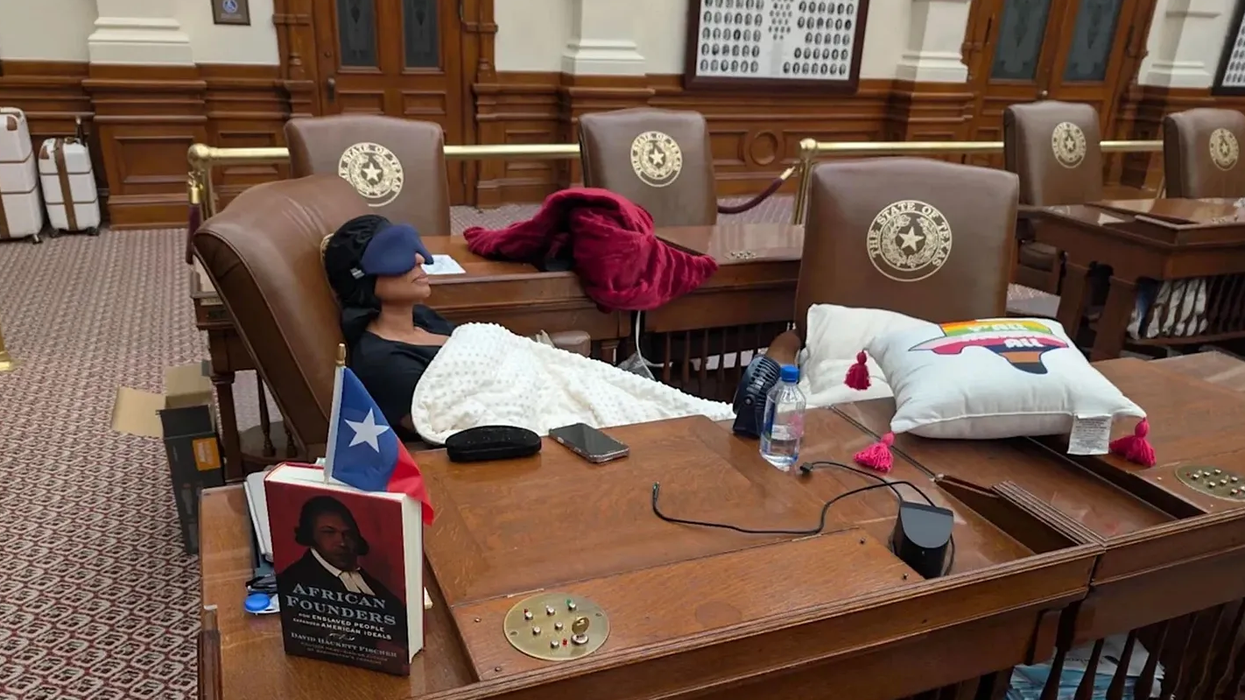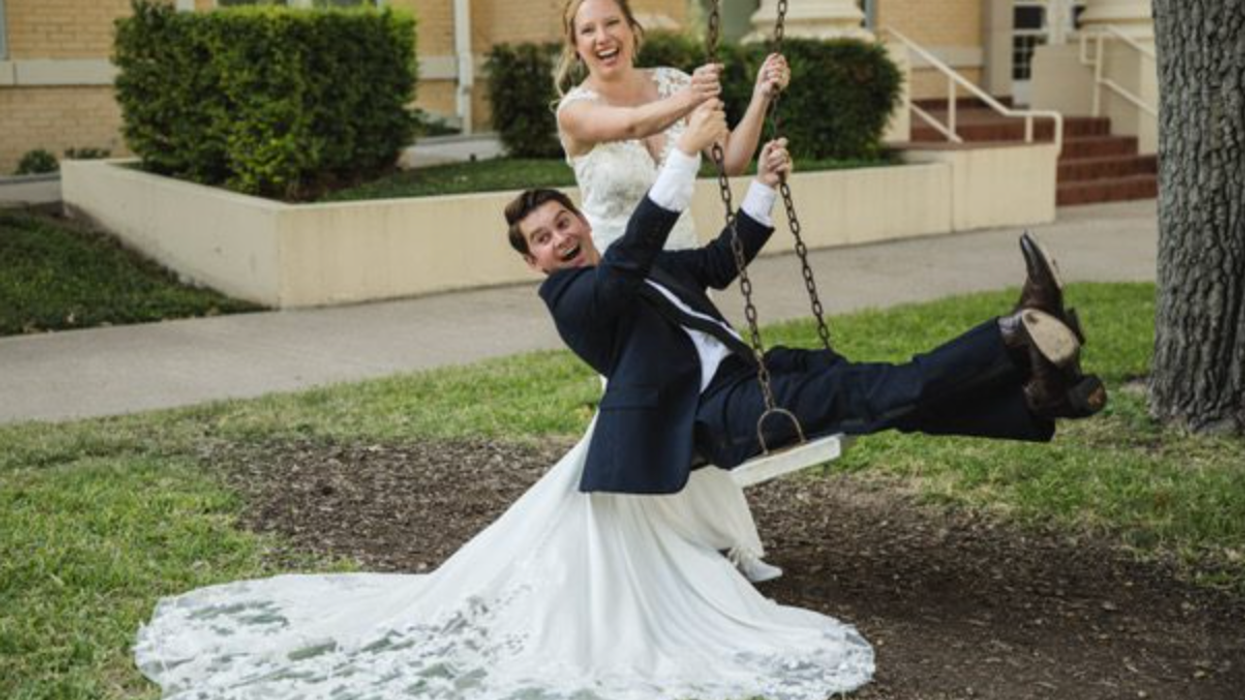Dustin Burrows, call your lawyer.
Burrows is the Republican Speaker of the Texas House. This week, he told all Democratic Representatives that they had to sign a permission slip to accept a 24/7 police escort if they wanted to leave the legislative chambers.
You heard that right. Democrats — but not Republicans — needed a permission slip, like schoolkids cutting class or criminal suspects. That was Burrows's heavy-handed school-principal response to the Democrats’ previous departure from the state to prevent the full legislature from passing a gerrymandered map to deliver five more Republicans to the House of Representatives.
But the Democrats had returned and were present for the new special session that Governor Greg Abbott called to ram through the new map, which was passed yesterday.
Enter Nicole Collier, a Democratic representative from Fort Worth. Collier read the form, thought about the implications, and told Burrows what he could do with his permission slip. She refused to sign and submit to having a police officer shadow her.
And so, under Burrows’s orders, she has been confined to the chamber itself, sleeping on chairs like a traveler abandoned in an airport terminal. She posted a photo of herself dozing on the House floor. And she’s been giving national interviews that make Burrows and his colleagues look like overbearing hall monitors who’ve stumbled into felony territory.
The twist is that Texas Democrats had already returned to Austin, clearing the way for Republicans to push through their redistricting plan — a map designed to squeeze out five more GOP seats. They only came back after California Democrats announced their own redrawn map to create five additional Democratic seats, a move the California Supreme Court has since blessed. In other words, Texas Republicans had already gotten what they wanted. Yet instead of basking in their new lines, Burrows decided to humiliate and detain a colleague in a show of brute force.
The obvious question is what authority Burrows has to keep Collier under a kind of House arrest.
The answer is: none whatsoever.
Texas House rules do include a provision that allows for a so-called “civil arrest” (a dubious category in itself — an arrest is an arrest and is subject to Fourth Amendment restrictions) of lawmakers who have fled the state to break quorum. The Texas Supreme Court upheld that power in a 2021 case, but it emphasized that House Rule 5 applies only to compel the attendance of absent members.
Collier, of course, isn’t absent. She’s sitting right there in the chamber. She hasn’t even tried to slip out a side door. That means the text of the rule gives Burrows no authority whatsoever to confine her, much less threaten her with arrest for refusing an escort.
So Collier has done exactly what the law prescribes: she’s filed a habeas corpus petition demanding her release. Habeas — the “Great Writ” — is one of the oldest protections in the Anglo-American legal tradition, and its paradigmatic use is for just this kind of moment, when an official detains someone without legal justification. By any fair reading, her petition should be an easy win.
But habeas is just the start. If Burrows’s legal cover falls away, as it should, his conduct isn’t just unauthorized — it violates any of a number of civil and criminal laws.
Start with false arrest. Under Texas law, false arrest (sometimes called false imprisonment) is simply the unlawful restraint of a person without legal justification. By the textbook definition, Collier has been arrested: a reasonable person in her position would not feel free to leave.
Then there’s the Texas crime of unlawful restraint, which the statute defines as knowingly restraining someone without consent. And “official oppression,” which makes it a crime for a public servant acting under color of law to subject another person to unlawful arrest or detention.
And it doesn’t stop at state law. There’s also federal civil rights law. Title 18, Section 242 of the U.S. Code makes it a crime for anyone acting under color of law to willfully deprive someone of their constitutional rights. Here, Burrows has deprived Collier of her liberty — and he’s done so because of her constitutionally protected political activity.
That’s the stuff of indictments, not just headlines.
To understand the brazenness here, it’s worth recalling how unusual “civil arrest” is in the first place.
Texas Republicans have reached for it before, most recently in 2021, when Democrats fled the state to block a restrictive voting bill. Back then, the Texas Supreme Court blessed the House’s power to compel absent members back to the chamber — but only absent members.
The tactic goes back even further. In 2003, when Democrats bolted to New Mexico to derail Tom DeLay’s mid-decade gerrymander, Texas officials talked tough about dragging them back, but ultimately stopped short.
The power to force attendance has always been understood as a narrow, exceptional tool. Never before has it been twisted into an open-ended license to hold lawmakers in de facto custody when they’re sitting in the chamber doing their jobs.
That’s what makes this episode different. It’s not about quorum. It’s about domination.
Burrows may think he’s projecting strength, but Collier has turned his gambit into a PR disaster.
Her decision to camp out on the House floor has generated sympathetic coverage and viral images. It’s a classic David-versus-Goliath tableau: one legislator sleeping on institutional chairs, up against the machinery of power.
And the public seems to get it. Democrats already scored a public-relations victory when they fled the state earlier this summer, leaving Republicans sputtering and powerless. Now, with Collier cast as an almost cartoonishly over-policed lawmaker, they’ve done it again.
Burrows, meanwhile, comes off as the Keystone Cop of legislative strong-arming. Instead of projecting authority, he looks petty, vindictive, and — worst of all — lawless.
Any recourse for Burrows’s lawlessness depends, of course, on whether Texas courts are willing to enforce the law as written. And whether Texas prosecutors are willing to hold Republican leaders accountable. With Governor Greg Abbott and Attorney General Ken Paxton at the helm, there’s little reason for optimism. The capture of Texas institutions by partisan enforcers is well underway.
And don’t expect relief from Washington. Pam Bondi’s Department of Justice is not about to bring a civil rights case against Texas Republicans on behalf of Nicole Collier.
Which leaves us with the broader lesson: what we’re seeing in Austin is not just local thuggery, but a microcosm of the authoritarian instinct that has infected American politics under Trump. It’s the idea that authority exists to dominate the opposition, and that the law means whatever the leader says it means.
In this sense, Collier’s stand isn’t just about Texas. It’s about the survival of the basic principle that no one, not even a legislative leader, gets to detain their political opponents at will.
Dustin Burrows thought he was flexing muscle. Instead, he’s exposed himself to civil liability, criminal prosecution, and national ridicule.
Collier has the law on her side, the courts in her corner, and the images of her “detention” circulating widely. Burrows has…a pledge form and a police escort fantasy.
If this is what passes for strength in Texas Republican leadership, it’s no wonder they’ve been reduced to cartoonish displays of power.
And if you want to see how authoritarianism takes root in America, you don’t have to look to Moscow or Budapest. Just look to Austin, where one lawmaker is being held against her will by colleagues who think power is its own justification.
Dustin Burrows, call your lawyer.
Harry Litman is a former United States Attorney and the executive producer and host of the Talking Feds podcast. He has taught law at UCLA, Berkeley, and Georgetown and served as a deputy assistant attorney general in the Clinton Administration. Please consider subscribing to Talking Feds on Substack.
Reprinted with permission from Substack.












